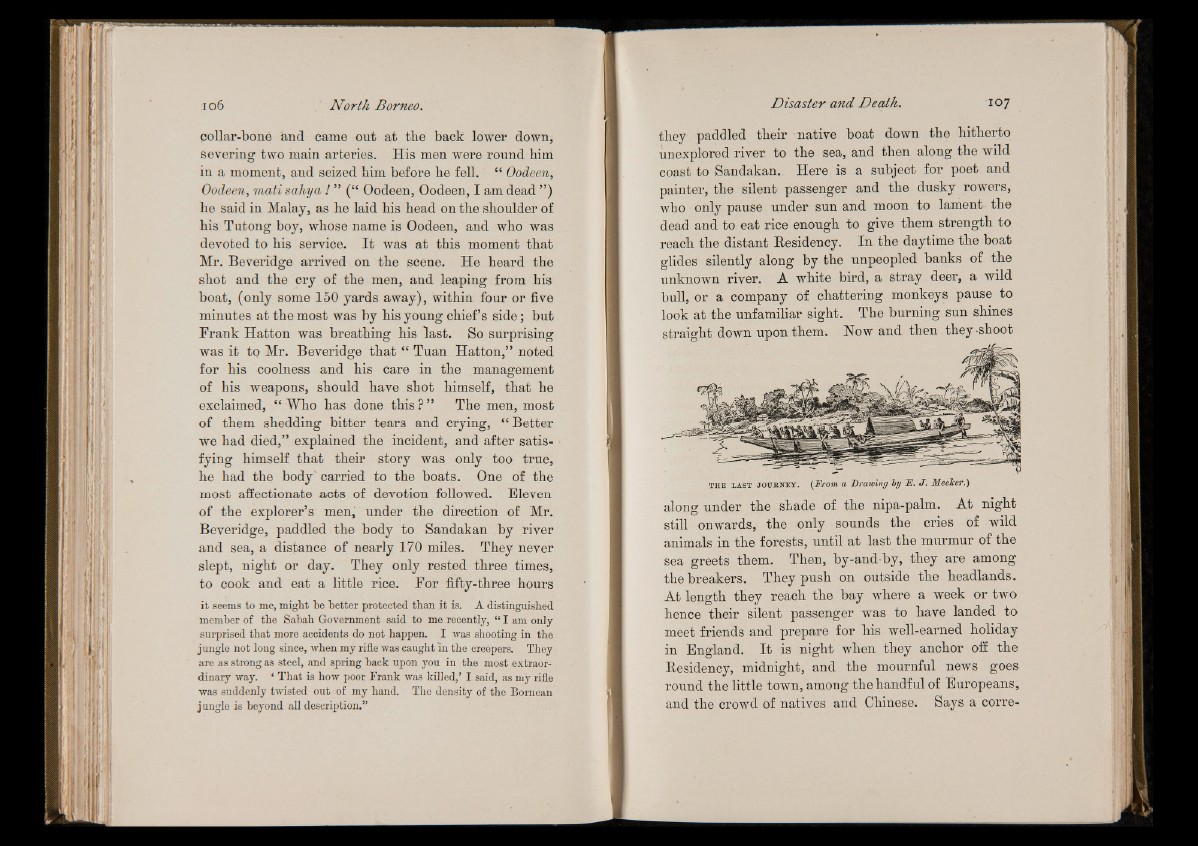
collar-bone and came out at the back lower down,
severing two main arteries. His men were round him
in a moment, and seized him before he fell. “ Oodeen,
Oodeen, mati sahya ! ” (“ Oodeen, Oodeen, I am dead ” )
he said in Malay, as he laid his head on the shoulder of
his Tutong boy, whose name is Oodeen, and who was
devoted to his service. I t was at this moment that
Mr. Beveridge arrived on the scene. He heard the
shot and the cry of the men, and leaping from his
boat, (only some 150 yards away), within four or five
minutes at the most was by his young chief’s side; but
Frank Hatton was breathing his last. So surprising
was it tQ Mr. Beveridge th a t ft Tuan Hatton,” noted
for his coolness and his care in the management
of his weapons, should have shot himself, that he
exclaimed, “ Who has done this ? ” The men, most
of them shedding bitter tears and crying, “ Better
we had died,” explained the incident, and after satisfying
himself th a t their story was only too true,
he had the body' carried to the boats. One of the
most affectionate acts of devotion followed. Eleven
of the explorer’s men, under the direction of Mr.
Beveridge, paddled the body to Sandakan by river
and sea, a distance of nearly 170 miles. They never
slept, night or day. They only rested three times,
to cook and eat a little rice. For fifty-three hours
it seems to me, might he better protected than it is. A distinguished
member of the Sabah Government said to me recently, “ I am only
surprised that more accidents do not happen. I was shooting in the
jungle not long since, when my rifle was caught in the creepers. They
are as strong as steel, and spring back upon you in the most extraordinary
way. ‘ That is how poor Trank was killed,’ I said, as my rifle
was suddenly twisted out of my hand. The density of the Bornean
jungle is beyond all description.”
they paddled their native boat down the hitherto
unexplored river to the sea, and then along the wild
coast to Sandakan. Here is a subject for poet and
painter, the silent passenger and the dusky rowers,
who only pause under sun and moon to lament the
dead and to eat rice enough to give them strength to
reach the distant Residency. In the daytime the boat
glides silently along by the unpeopled banks of the
unknown river. A white bird, a stray deer, a wild
bull, or a company of chattering monkeys pause to
look at the unfamiliar sight. The burning sun shines
straight down upon them. Now and then they shoot
t h e e a s t j o u r n e y . (From a Drawing by IE. J. Meeker.)
along under the shade of the nipa-palm. At night
still onwards, the only sounds the cries of wild
animals in the forests, until at last the murmur of the
sea greets them. Then, by-and-by, they are among
the breakers. They push on outside the headlands.
At length they reach the bay where a week or two
hence their silent passenger was to have landed to
meet friends and prepare for his well-earned holiday
in England. I t is night when they anchor off the
Residency, midnight, and the mournful news goes
round the little town, among the handful of Europeans,
and the crowd of natives and Chinese. Says a corre